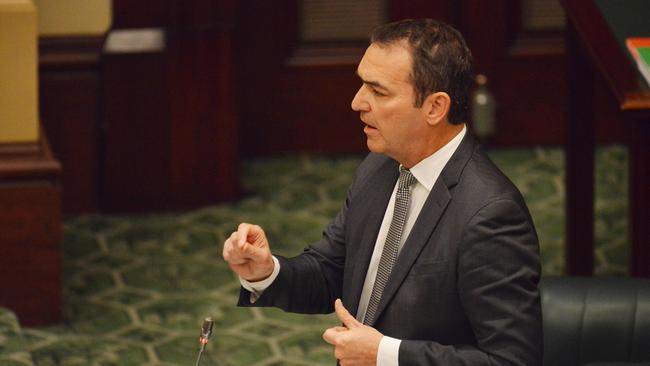Daniel Wills: Power politics all about hip pocket — believe it or not Steven Marshall says he can save you $302
POWER politics are complex, but Opposition Leader Steven Marshall now has one thing Labor doesn’t — a firm dollar figure he claims will be slashed from your bill, State Political Editor Daniel Will writes.

Opinion
Don't miss out on the headlines from Opinion. Followed categories will be added to My News.
- Save $300 a year off your power bill: Libs
- Time’s up for renewable power handouts, Federal Libs
- What happened after the South Australian statewide blackout
- Finkel report for dummies: National energy plan explained
- Revealed: $550m plan to fix power crisis in SA
OPPOSITION Leader Steven Marshall’s power plan has one big advantage over Labor’s. It includes a clear dollar figure of promised savings that he says will be slashed from your bill.
Energy is likely to be the single biggest issue at the state election in March. Frequent blackouts have become infuriating and the skyrocketing costs of bills is enraging.
But more than that, the price of power is one of the biggest issues confronting a state economy that is losing much of its traditional industrial base and struggling to make a transition.
For many people watching the energy debate, it's a confusing mess of acronyms and blame trading where every politician wears partial blame for an unnecessary collective failure.
Today, Mr Marshall has released its plan. Only engineers and fortune tellers are likely to be able to properly compare it to Labor’s and determine which, if either, is really going to work.
The politics will be fought on much simpler grounds of trust, and priorities.
Premier Jay Weatherill has positioned himself and Labor as green champions. They have pushed forward with a radical overhaul of the grid to bring down SA’s emissions, with almost half of the state’s energy now coming from wind, at the expense of price and reliability.
It has won him acclaim in Paris, plays fantastically with the Labor base, and gives Mr Weatherill the air of being a leader who looks to the future and is willing to take on big experiments.
The plan for a state-owned power station, nine emergency diesel generators which are to be eventually flipped to gas, also appeals to an old-fashioned Playford-era idea of self-reliance.
Mr Marshall is happy to walk away from the green dream to focus squarely on cost and reliability. Renewables remain a part of the plan, but as third-order concerns.
Whether this cost saving can be achieved is unknown, but the contrast is now clear.
When Mr Weatherill released his plan earlier this year, he said it would put “downward pressure on prices”. He was unable to say by how much bills would fall and when that would happen.
Just months later, households were his with another double-digit percentage price increase.
Mr Marshall’s paid-for modelling, delivered by respected consultancy firm ACIL Allen, gives him a firm figure of $302 in savings against today’s bills to be delivered within five years.
This exact amount is unlikely to be realised. It could be more, it could be a lot less. The energy market is so outrageously complex that no firm prediction that far out can be taken as gospel.
But it gives him something to credibly argue in advertising and media appearances.
The public views on energy are mixed and, at times, hard to reconcile. There is strong support in polls for renewable energy. There is anger over blackouts and outrage at high bills.
Voters seem to crave a solution that engineering is on the way to achieving but has so far been unable to produce — low emissions energy which is available all the time and cheap to deliver.
In Australia’s political history, price has always won when it collides with carbon emissions.
Former prime minister Kevin Rudd promised bold action on climate change and dumped it when polling showed people weren’t prepared to pay. The 2013 federal election was a contest on the carbon tax, which gave the Coalition victory as it spooked the electorate about the cost of action.
History says Mr Marshall can win energy, and the election, if the Liberals convince the public that they are the party of lower bills. Labor, in the driver’s seat for almost 16 years and watched as SA’s prices become the highest in the world, will certainly struggle to claim that mantle.
But, with the Liberals’ energy policy, we may have also seen SA Best’s first impact on the election. Mr Marshall has been urged for months to deliver his plan to the people.
On Friday, SA Best Leader Nick Xenophon radically changed the dynamic of this election.
By declaring he would personally run in the Lower House, he raised the very real prospect of a genuine three-way contest where SA Best could win a large number of seats.
Many of those currently most at threat are in Liberal heartland through the Hills and country.
The decision to release this plan today seems to be an attempt to show that the Liberals are serious about developing detailed plans for Government, not just carping from the sideline.
While the Liberals may have previously been willing to bet that Labor’s plan would fail in the coming summer and voters would then flock to them as the only alternative, Mr Marshall now has to battle the election on two fronts. It is no longer enough just to convince voters that it’s time for Labor to go and the Liberals should be elected by default. Mr Marshall now has to articulate clear reasons to support him, rather than voting against the Government.
And he can now expect this plan to undergo the same forensic scrutiny as Labor’s.


